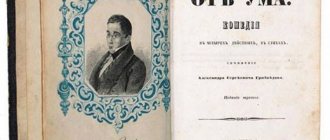Contradictory nature
Sophia is the only person who is close to the smart and educated Chatsky, a character opposed to the society of conservatives and people-pleasers. Sophia became the cause of the young nobleman's suffering, a source of gossip, and a creator of intrigue. Such a combination of two contrasts in one image confirms its reality, which the author strived for. A soulless, stupid secular beauty or, conversely, an educated noblewoman who is passionate about science would not have aroused so much interest. It is this inconsistency that can explain the strength of the feelings that Chatsky, an ardent and eloquent young man, experiences for her. A rich bride, a real daughter of her father, she grew up in an atmosphere of care and attention, and learned to find benefits for herself.
Society
Once upon a time, as a teenager, Sophia willingly laughed with Chatsky at mutual acquaintances. She also thought funny “three of the tabloid faces” and “that little black one on crane legs,” uncle and auntie, the Frenchman Guillaume. But for a long time Chatsky was not around, and all these funny people made up her society, her circle, her family. She is used to forgiving their shortcomings and appreciating the good that is in them.
Trying to entertain his childhood friend, Alexander Andreevich makes a fatal mistake. By attacking Sophia's relatives and friends, he unwittingly wounds her too. It was as if a stranger had burst into a cozy home circle and began to destroy everything. The heroine is insightful enough to understand the shortcomings of those around her, and has true wisdom because she has learned not to judge people.
Respecting the rules of society, Sophia recklessly breaks them by falling in love with her father's secretary. Her feelings are a daring challenge to norms of behavior. If the affair is revealed, Famusov will send his daughter to the village, and she herself will become the object of caustic ridicule and general indignation.
Sophia's appearance and hobbies
The girl is beautiful and young:
“At seventeen you blossomed beautifully...”
It is clear why no one is surprised by the number of gentlemen. Beauty attracts prim (Skalozub), stupid (Molchalin), educated (Chatsky) suitors. The flighty young lady does not value the attitude towards herself, realizing that her beauty will not go unnoticed.
The lovely little girl grew up without maternal affection: her mother died early. Her father assigned her a governess from France, who instilled her taste and helped her develop her individuality. Home education allowed Sophia to become versatile and interesting:
- can sing;
- dances gracefully;
- loves and understands music;
- plays several musical instruments (piano, flute);
- knows French;
- reads books in a foreign language.
The girl is trained in feminine “tricks”: sighs, tenderness, cunning tricks.
Qualities that bring Sophia closer to her father’s company
The desire to dominate. Love for Molchalin is not just a youthful feeling. Sophia is looking for a man from those whom she can push around. In it you can see the features of female characters dragging their husband and servants by the hair. Power in the family is a girl’s desire, perhaps still hidden even to her. But it will take a very short period of time, she will understand what she is striving for. In the comedy there is an analogy with the Gorich couple, where the wife disposes of her husband like a thing, turning the other half into a weak-willed creature:
“husband-boy, husband-servant, one of the wife’s pages...”.
Immorality. Some literary scholars (P.A. Vyazemsky) consider the girl immoral. One can argue with this position, but there is some truth in it. If we logically construct Sophia’s day, which passed before the readers, then the picture will not be very beautiful: the night is in the bedroom with a man, during the day she pretends to be sick, but asks the maid to bring Molchalin to her, at night she secretly makes her way to his room. This behavior is shameless. He cannot be compared to the modest characters of classical literature who secretly suffer for their beloved. No social decency restrains the master's daughter.
Healthy family website
- Motives for Sophia's actions
The image of Sophia is considered the most complex in Griboedov's comedy.
The interpretation of her character, identifying the motivations for her behavior - all this caused numerous disputes among critics. The image of Sophia, as Belinsky noted, is extremely contradictory. She is endowed with many virtues: a lively mind, will, independence and independence of judgment, energy of character. Sophia does not value the opinion of Famus society: “What do I need rumors for? Whoever wants to, judges it that way...”
Disregarding social etiquette, she decides to have a night date with Molchalin. In this episode, B. Goller saw a “challenge”, a rebellion against the hypocritical moral principles of Famus society. “The young lady who violated the prohibitions was expected to break with society. Or removal from society,” the critic wrote.
Sophia's behavior is natural: she cannot hide her feelings after seeing Molchalin fall from his horse. “I’m afraid that I won’t be able to withstand the pretense,” she remarks to Alexei Stepanovich. To some extent, the heroine is “natural” in her relationship with Chatsky: she is sincerely angry in response to his witticisms. At the same time, Sophia skillfully lies to her father, hiding her relationship with Molchalin from him.
Sophia is unselfish, she evaluates people not by the presence of ranks and wealth, but by their inner qualities. Famusov is trying to find a profitable match for his daughter: “he would like a son-in-law with stars and ranks.” Sophia does not accept such morality: she wants to marry for love. In her nature, “hiding in the shadows is something of her own, hot, tender, even dreamy.”
Famusov reads Colonel Skalozub as her groom - Sophia doesn’t even want to hear “about such happiness”: “He hasn’t uttered a smart word in his life, I don’t care what’s for him, what’s in the water.”
Sophia is quite insightful: she correctly assesses Skalozub, perfectly sees the vulgarity and emptiness of the people entering Famusov’s house. However, she cannot “see” Molchalin’s “true face”.
Motives for Sophia's actions
Sophia is drawn unclearly...
As we noted above, this image caused the most controversy in criticism. Pushkin also wrote that Sophia was “not clearly outlined.”
Goncharov believed that Sophia was strongly influenced by her environment: “It is difficult to be unsympathetic to Sofya Pavlovna: she has strong inclinations of a remarkable nature, a lively mind, passion and feminine softness. It is ruined in the stuffiness, where not a single ray of light, not a single stream of fresh air penetrates.”
Belinsky, considering the heroine’s contradictory character unreal, wrote that Sophia is “not a real person, but a ghost.”
Let's try to figure out what Griboyedov's heroine really is like by analyzing her upbringing and life circumstances.
Famusov is a widower, Sophia, who grew up under the supervision of Madame Rosier, obviously enjoyed a certain freedom in the house. Like Pushkin's Tatiana, she is dreamy, akin to sentimental novels with a happy ending, where one of the heroes is poor but has a number of virtues. This is precisely the kind of hero, in Sophia’s opinion, that Silence is: “yielding, modest, quiet, Not a shadow of worry in his face, And no offenses in his soul...”.
Griboyedov's heroine, like Tatyana Larina, loves in her chosen one not a specific person, but her high ideal, drawn from books.
Researchers noted that Sophia’s inner world, like Chatsky’s inner world, is largely determined by the literary and cultural stereotypes of romanticism.
“However, they represent different traditions in romanticism: behind Sophia is the world of ballads and “French books”, behind Chatsky is the world of Byron. ...The formal conflict of styles is also matched at the substantive level of love intrigue: Chatsky and Sophia think in different languages and cannot understand each other, including when it comes to love.”
However, Sophia also looks unnatural in her relationship with Molchalin. It is very difficult to characterize a loved one, but she easily outlines the character of her chosen one, not forgetting to add that “he doesn’t have that mind... which is quick, brilliant and will soon become disgusting.”
The characters' nightly date itself, this sensitive scene, is nothing more than a romantic cliché. Sophia's story about the night date makes Lisa laugh, who in this scene is the embodiment of common sense. She remembers Aunt Sophia, from whom the young Frenchman ran away. And this story seems to anticipate the further development of events in the comedy.
Chatsky puts forward his own version of Sofia’s choice of Molchalin. He believes that the ideal of a heroine is “a husband-boy, a husband-servant, one of a wife’s pages.” At the end of the comedy, having learned the truth about Sophia’s choice, he becomes caustic and sarcastic, accusing her of adopting the vulgar morality of Famus’s world.
However, Chatsky's accusation is unfair. Sophia is an extraordinary, deep nature, different in many ways from people in her circle. Noticing Molchalin with Liza, Sophia is offended in her feelings, and reconciliation with him is impossible for her.
And she doesn’t need the “high ideal of all Moscow husbands,” she needs true love. The main motive for Sophia’s behavior is resentment towards Chatsky, who once left her. It is not for nothing that Molchalin possesses qualities that are directly opposite to Chatsky’s character: Alexei Stepanovich is moderate in everything, neat, quiet, silent, “not rich in words,” he does not have “that mind that is a genius for others, but for others a plague...”, “strangers and He doesn’t cut at random.”
Frank resentment can be heard in the words of the heroine: “Ah! If someone loves someone, Why search for the mind and travel so far? Hence her slander (“...not a man, a snake”), her gossip about Chatsky’s madness. This is exactly how many researchers explained Sophia’s behavior.
We wonder why she doesn’t want to tell Chatsky the truth about her feelings for Molchalin, but the reasons for this are simple: she keeps her admirer in the dark, wanting to take revenge on him. Sophia cannot forgive Chatsky for his departure, his “three-year silence.” Is her attachment to Chatsky alive in her soul? This question cannot be answered unambiguously. It seems that we cannot find an answer to this in the text of the comedy. But Sophia’s resentment and, as a consequence, hostility can be seen clearly and definitely.
Thus, the motives for the heroine’s behavior are very complex. A lot can be discerned in them: resentment, pity - Sophia sympathizes with Molchalin, knowing the “angry disposition” of her father, “patronage, the curiosity of a young feeling for the first intimate relationship with a man, romanticism, the piquancy of domestic intrigue...”.
The heroine is not really interested in Molchalin as such. She only thinks she loves him. As Vasiliev notes, “under the influence of books, Molchalin aroused in Sophia’s heart a completely independent, original novel, which was too complex to lead to passion.”
Therefore, Chatsky is not far from the truth when he does not believe in Sophia’s feelings for Molchalin. This is not the psychological blindness of the hero, but rather his intuitive insight.
However, when in the finale Sophia finds out the whole truth about her chosen one, this discovery becomes a real drama for her. She is insulted and humiliated, feels shame, bitterness and disappointment.
Thus, Sophia is a complex three-dimensional character, contradictory and ambiguous, in the portrayal of which the playwright follows the principles of realism.
The image of Chatsky in the comedy Woe from Wit
Qualities that set her apart from her father's environment
The girl loves to read and tends to spend a lot of time reading books. For the Famus society, books are the cause of all troubles. They stay away from them, afraid to gain knowledge that could change their attitude towards life. Sophia is passionate about novels. She looks for prototypes of heroes in reality and is mistaken. The girl becomes a victim of deception and lies, having examined the features of the romantic handsome man in Molchalin. Other qualities that distinguish her among society ladies:
Courage.
Sophia is not afraid to confess her feelings to her father. She is ready to unite herself with a poor serviceman for the sake of her beloved. The girl is not even afraid of possible rumors and gossip.
Determination
. The girl stands up to defend her feelings, sensing a threat from Chatsky. She takes revenge for ridiculing Molchalin. Moreover, he does not choose softer methods. Sophia resolutely spreads the idea of the madness of her childhood friend, even without taking into account his feelings for her.
Gullibility.
Having fallen under Molchalin's charm, the girl does not notice the truth of his feelings. Her eyes are covered with a veil. Like a real lover, she falls into the bonds of deceit and becomes ridiculous.
Frankness.
Sophia thinks openly, builds her speech, not being afraid to reason and dream. The owner's daughter is not characterized by secrecy, deceit, or florid thinking.
Pride.
All the girl’s behavior shows her respect for herself. She carries herself with dignity, knows how to get away from a conversation in time, and does not give the opportunity to reveal her secrets. Even in the last scene, she does not lose her pride, which is visible in her indignation and inaccessibility. Molchalin’s phrases were perceived correctly by Sophia. She is bitter and harsh.
Sofya Pavlovna is a complex female character, a real heroine of her time. It’s hard for her to live among secular young ladies and not become completely like them, to preserve her face and individuality. The reader can judge the girl, but first you need to put yourself in her place and try to determine whether you can become different if there is no such example nearby.
Conclusion
A lot of reproaches can be directed at Sofya Famusova. She is a liar: she shamelessly deceives her own father. She treats Lisa poorly: she makes her the confidant of her heartfelt affairs, but at any moment she can sharply reprimand her and shout at her. Due to her whim, the maid does not sleep at night, and during the day she hardly manages to rest. The girl did not plan to slander Chatsky, but is glad to take the opportunity and does nothing to dispel the rumors. However, we must not forget that Sophia is a child of her time. The narrowness of her horizons and the stereotypes that dominate her imagination are not the heroine’s personal shortcomings, but qualities that are characteristic of more than one generation.
The image of Sophia in A. S. Griboyedov’s comedy “Woe from Wit” proves how the nobility (its female part) is not yet ready for the penetration of progressive views into society, for the emergence of people who think in a new way. Simply put, the time has not yet come for the appearance of women like Turgenev’s Elena Stakhova.
Characterizing the image of Sophia can be useful when writing essays and for preparing literature lessons.




